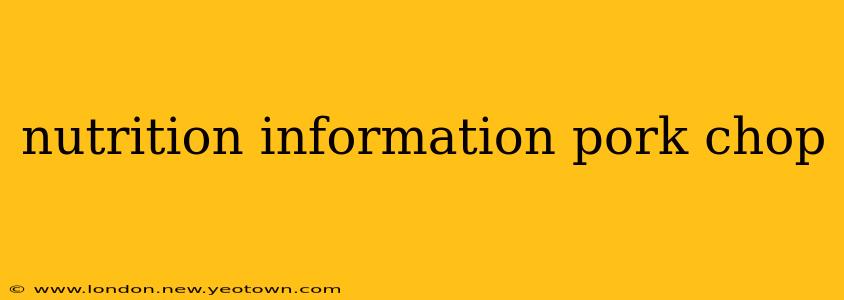The humble pork chop. A culinary staple across cultures, it's a versatile cut of meat that lends itself to countless recipes, from simple pan-frying to elaborate gourmet dishes. But beyond its delicious taste and satisfying texture lies a nutritional profile that deserves a closer look. Let's delve into the world of pork chop nutrition, exploring its benefits and addressing common concerns.
What are the nutritional benefits of pork chops?
Pork chops are a good source of protein, essential for building and repairing tissues, producing enzymes and hormones, and supporting overall bodily functions. A 3-ounce serving of lean pork chop offers roughly 20-25 grams of protein, contributing significantly to your daily protein needs. But it's not just protein; pork chops also boast a range of essential vitamins and minerals. They're a decent source of thiamin (vitamin B1), crucial for energy metabolism, and niacin (vitamin B3), which plays a role in cell function and DNA repair. Furthermore, pork chops contain vitamin B6, vital for brain development and immune function, and selenium, an antioxidant that protects cells from damage. Finally, they're a source of iron, necessary for red blood cell production and oxygen transport throughout the body.
How many calories are in a pork chop?
The caloric content of a pork chop varies significantly depending on the cut, cooking method, and added ingredients. A 3-ounce serving of lean pork chop typically contains between 180-250 calories. However, fattier cuts or those cooked with added oils or breading can substantially increase the calorie count. Choosing lean cuts and opting for healthier cooking methods, like grilling or baking, can help keep calories in check.
Are pork chops healthy?
The healthiness of a pork chop hinges largely on the fat content and preparation method. Historically, pork chops carried a reputation for being high in saturated fat. However, modern pork production techniques have resulted in leaner cuts with significantly reduced saturated fat levels. Choosing lean cuts and trimming visible fat before cooking drastically improves the nutritional profile. Furthermore, mindful cooking methods, such as baking, grilling, or broiling, minimize the addition of unhealthy fats. When prepared thoughtfully, pork chops can certainly be part of a balanced and healthy diet.
What are the downsides of eating pork chops?
While generally nutritious, there are potential downsides to consider. Some individuals may be sensitive to pork, experiencing allergic reactions. Additionally, consuming excessive amounts of saturated fat can contribute to heart disease risk. Therefore, moderation is key, and choosing lean cuts is crucial for mitigating these potential risks. Furthermore, the sodium content can be a concern depending on how the pork chop is prepared and seasoned. Be mindful of added salts and sodium-rich sauces to manage sodium intake.
How can I make pork chops healthier?
To maximize the health benefits and minimize the potential drawbacks, prioritize lean cuts of pork and opt for healthy cooking methods. Trimming away visible fat before cooking reduces saturated fat intake. Baking, grilling, or broiling are healthier alternatives to frying, minimizing added oils and preventing excess fat absorption. Seasoning your pork chops with herbs and spices instead of relying heavily on salt will help control sodium intake, enhancing flavor without compromising health.
How much pork chop should I eat per week?
There's no single magic number for pork chop consumption per week. A healthy diet is about balance and variety. Incorporating pork chops as part of a varied diet that includes fruits, vegetables, whole grains, and other lean protein sources is key. The amount you consume should align with your overall calorie and macro-nutrient goals, keeping in mind recommendations for saturated fat intake. Consulting a registered dietitian or nutritionist can provide personalized guidance tailored to your specific needs and health goals.
By making informed choices about the cut of pork, cooking method, and portion size, you can enjoy the delicious taste of a pork chop while reaping its nutritional benefits as part of a healthy lifestyle. Remember, moderation and balance are key to any successful dietary plan.

